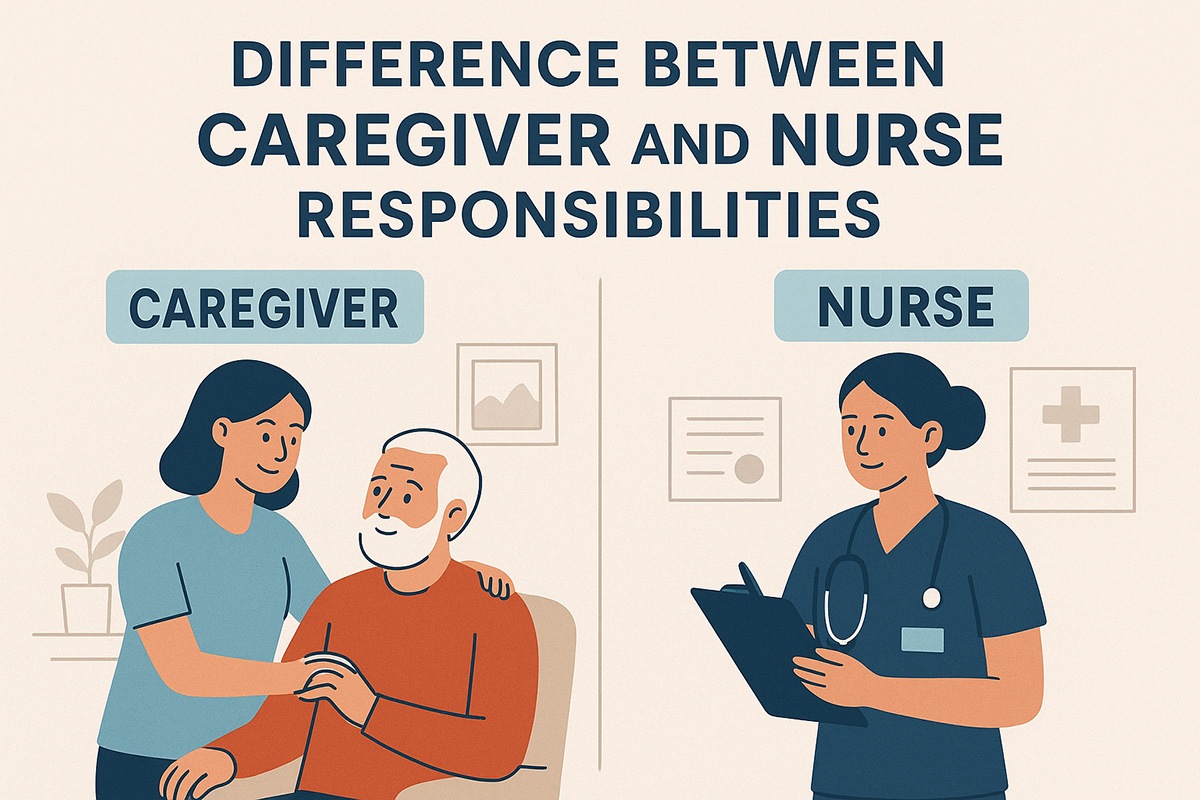When it comes to elderly care, home health support, or medical assistance, people often confuse the roles of caregivers and nurses. While both professions are dedicated to improving the well-being of patients, their responsibilities, qualifications, and levels of care are quite different. Understanding these differences helps families choose the right support for their loved ones and ensures proper care delivery.
What Is a Caregiver?
A caregiver is a trained or untrained individual who provides non-medical support to someone who needs help with daily living. Caregivers are commonly hired for elderly parents, individuals with disabilities, or those recovering from illness or surgery.
Typical Caregiver Responsibilities
- Assistance with Activities of Daily Living (ADLs): Bathing, dressing, grooming, and toileting.
- Meal Preparation and Feeding: Cooking nutritious meals and helping with eating if necessary.
- Household Support: Light housekeeping, laundry, and grocery shopping.
- Companionship: Offering emotional support, conversation, and social engagement.
- Medication Reminders: Ensuring patients take prescribed medicines on time (without administering them).
- Mobility Assistance: Helping with walking, transfers, or using mobility aids.
???? Caregivers focus on comfort, safety, and everyday living support rather than clinical tasks.
What Is a Nurse?
A nurse is a licensed healthcare professional with formal medical training and certifications (such as Registered Nurse – RN, Licensed Practical Nurse – LPN, or Enrolled Nurse – EN). Nurses can work in hospitals, clinics, or home care settings.
Typical Nurse Responsibilities
- Medical Assessments: Monitoring vital signs, evaluating health conditions, and reporting changes.
- Administering Medications: Giving injections, IV fluids, and oral medications safely.
- Wound Care and Dressing Changes: Cleaning and dressing surgical wounds or pressure ulcers.
- Chronic Illness Management: Supporting patients with conditions like diabetes, hypertension, or heart disease.
- Post-Surgery Care: Assisting in recovery after medical procedures.
- Coordination with Doctors: Communicating patient updates and following medical instructions.
- Specialized Care: Managing catheters, oxygen therapy, ventilators, and other medical equipment.
???? Nurses focus on clinical, medical, and technical care that requires professional training and licensing.
Key Differences Between Caregiver and Nurse Responsibilities
| Aspect | Caregiver | Nurse |
|---|---|---|
| Training & Certification | Often no formal medical training required; some may complete caregiver courses | Requires nursing degree, license, and professional training |
| Type of Care | Non-medical, daily living assistance | Medical and clinical care |
| Medication Role | Can remind patients to take medication | Can prescribe (in some cases), administer, and manage medications |
| Supervision | Works under family guidance or care agency | Works under healthcare protocols, may supervise caregivers |
| Primary Focus | Comfort, companionship, daily living | Health monitoring, treatment, medical recovery |
| Environment | Home-based or assisted living | Hospitals, clinics, or home healthcare |
When Do You Need a Caregiver vs. a Nurse?
- Choose a Caregiver if: Your loved one primarily needs help with daily activities, companionship, and non-medical support.
- Choose a Nurse if: Your loved one requires ongoing medical treatment, chronic disease management, or post-surgery care.
In many cases, families may need both caregivers and nurses working together to ensure holistic support.
Final Thoughts
The difference between caregiver and nurse responsibilities lies mainly in the type of care provided. Caregivers support everyday living and emotional well-being, while nurses deliver professional medical care and treatment. Choosing the right care provider depends on your loved one’s health condition and daily needs.
By understanding these differences, families can make informed decisions and ensure their loved ones receive the best possible care.



